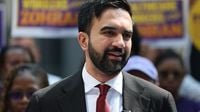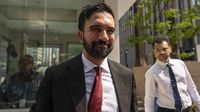In a contest that’s upending New York City’s political landscape, Zohran Mamdani, a self-described Democratic socialist and the Democratic nominee for mayor, is leading the polls and reshaping alliances as the November 2025 election approaches. Once viewed warily by moderate Democrats, Mamdani is now at the center of a political storm, with party leaders, rivals, and strategists all recalibrating their positions in response to his unexpected rise.
On August 17, 2025, former Congressman Anthony Weiner, whose own career collapsed under the weight of scandal, predicted on WABC 770 AM’s “The Cats Roundtable” that top New York Democrats—namely Senate Minority Leader Chuck Schumer and House Minority Leader Hakeem Jeffries—will eventually have no choice but to endorse Mamdani, despite their visible hesitation. "At the end of the day, people like Chuck Schumer and Hakeem Jeffries, they are going to have to endorse the nominee of their party [Mamdani]," Weiner declared, as reported by The New York Post.
Weiner, whose political downfall began in 2011 with a series of sexting scandals and a criminal conviction related to sexting with a minor, reflected on the shifting dynamics within the Democratic Party. “Some people can stay on the sidelines, and I think you’re going to see a lot of people do that. But the leaders of the party, which Chuck and Hakeem are, are caught between the devil and the deep blue sea,” he said. According to Weiner, the reluctance of Schumer and Jeffries to endorse Mamdani stems from fears that aligning with a left-leaning nominee could harm moderate Democratic candidates in the crucial 2026 midterm elections.
Despite the hesitancy at the top, the momentum appears to be firmly with Mamdani. A Siena College poll released on August 12, 2025, showed Mamdani commanding 44 percent of the vote, with former Governor Andrew Cuomo trailing at 25 percent. Republican Curtis Sliwa garnered 12 percent, while incumbent Mayor Eric Adams, running as an independent after skipping the Democratic primary, trailed with just 7 percent. The crowded field, political observers note, is helping Mamdani consolidate support among voters eager for change.
But Mamdani isn’t simply riding a wave of progressive enthusiasm. In recent weeks, he’s taken calculated steps to broaden his appeal, reaching out to demographics traditionally wary of his politics. On August 11, he met with business leaders and delivered a speech at an African Methodist Church, signaling a willingness to engage with both the city’s economic establishment and its religious communities. As The Hill reported, Mamdani’s efforts to “widen his tent” are being closely watched by strategists on both sides of the aisle.
“He’s getting more endorsements slowly. He’s getting more meetings. And people and industries are looking to gear up for a Mamdani administration,” said Republican strategist Susan Del Percio, who previously advised Andrew Cuomo. Del Percio noted that many organizations are either offering their support to Mamdani or, by withholding endorsements from others, effectively conceding to his likely victory. “It’s just a recognition of, ‘This is who I’m probably going to be working with in six months,’” she told The Hill.
Mamdani has also made moves to reassure moderates. In July, he publicly condemned the phrase “globalize the intifada,” a gesture aimed at calming concerns among centrist voters. And on August 10, he indicated he was open to retaining Jessica Tisch as police commissioner, a decision that could unsettle his far-left base but offers an olive branch to those worried about public safety and continuity in law enforcement leadership.
Still, the campaign has not been without fierce attacks. On August 4, Andrew Cuomo launched a viral broadside against Mamdani on social media, accusing him of occupying a rent-controlled apartment that, Cuomo argued, should go to a homeless family. “Somewhere last night in New York City, a single mother and her children slept at a homeless shelter because you, assemblyman @ZohranKMamdani, are occupying her rent controlled apartment,” Cuomo wrote. He went on to criticize Mamdani’s personal wealth and property holdings, framing the candidate as out of touch with the city’s affordability crisis. “We are in the middle of a historic affordability crisis. Millions of low income New Yorkers need this apartment and an apartment like it. Yet your apartment remains rented to rich people who don’t need it,” Cuomo’s statement continued, calling on Mamdani to vacate the unit “immediately.”
Meanwhile, the city’s Democratic establishment remains in a bind. According to The Hill, party leaders such as Schumer, Jeffries, and Governor Kathy Hochul have so far withheld endorsements from Mamdani, reflecting ongoing unease about his left-leaning platform and its potential impact on down-ballot races. Political strategist Basil Smikle observed, “Because it’s New York City, he’ll have to talk to corporate America, and he’ll have to talk to real estate because that is part of the economic foundation of our city.” Smikle suggested that Mamdani must find common ground with the city’s business interests while remaining true to his progressive base.
Democratic strategist Joel Payne highlighted the importance of reaching out to working-class and African American voters, a group with whom Mamdani has yet to make significant inroads. “The one part of the electorate that he could do a market improvement with would be working class, particularly African American, voters, who are a more traditional Democratic constituency,” Payne said. He emphasized that economic issues remain central to these voters, much as they were to Mamdani’s primary supporters.
Political observers like Grant Reeher, director of Syracuse University’s Campbell Public Affairs Institute, argue that Mamdani’s outsider status and the electorate’s dissatisfaction with the status quo are working in his favor. “He’s being helped by a somewhat crowded field with other legitimate candidates,” Reeher noted, adding that Mamdani’s traction may ultimately depend on how unpalatable Cuomo appears to more mainstream Democrats.
Yet, as Del Percio cautioned, the road ahead for Mamdani is anything but smooth. “He’s not ready for prime time. He’s got to be doing everything he can to get ready for it, and it’s going to be really hard,” she said, warning that the national spotlight will be intense, especially with the possibility of a high-profile clash between a Mamdani-led New York and a potential Trump presidency.
For his part, Weiner—whose own attempt at a political comeback in June 2025 ended in defeat—offered a blunt assessment of the Democratic Party’s current trajectory. “Right now, the Democratic Party in a lot of parts of New York … is very, very left to the point of falling off the edge of the cliff,” he said. He questioned whether leftist candidates could effectively govern, citing cities like Chicago and San Francisco as cautionary tales. “The bigger problem is what outcomes are we going to get as citizens and taxpayers if these candidates are successful? Unfortunately, it looks like we’re going to find out in New York City.”
As the city braces for a potentially historic election, one thing is clear: Zohran Mamdani’s candidacy is forcing New Yorkers—and the Democratic Party itself—to confront fundamental questions about the direction of their city and their politics. The coming months promise more drama, more debate, and, perhaps, a new chapter in the city’s storied political history.


